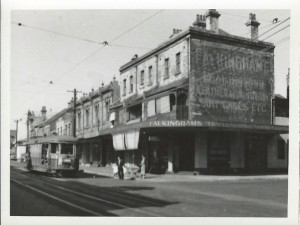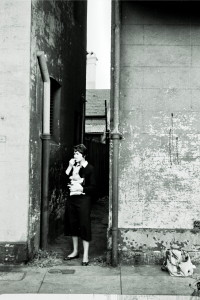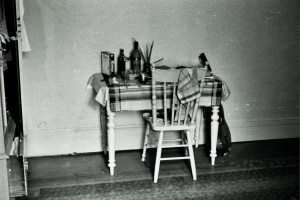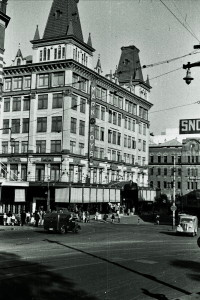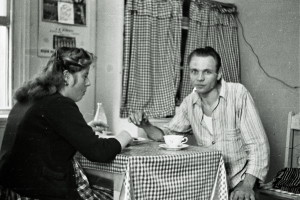LONDON TO SYDNEY BY TRACTOR — ’53-’54 –
AFTER TRAVELLING HALF WAY ROUND THE WORLD WE HAD FINALLY ARRIVED AT OUR DESTINATION _ THE ROYAL AGRICULTURAL SHOW IN SYDNEY, AUSTRALIA. WE WERE BROKE, AND NEEDED MONEY FOR A SHIP HOME.
“Gunna buy yer wife a parrit?” the Aussie pet-shop owner asked Tom. “Got some bonzer birds ‘ere…whaddyer think a them? Best birds in Sydney, Mate”.
We were looking for a room to rent in Paddington, an area of Sydney which had become run down since the end of the war in 1945 and by 1954, when we arrived in Australia, was considered a slum. It would have to be cheap. We were totally broke, exhausted, and both looking for jobs so that we could save enough money for passage to America, Tom’s home and where we were intending to live.. And, to pop the icing on the cupcake, I was pregnant. A bloody parrot was the last thing we needed.
“Not today, Mate” Tom said. “We’re looking for a room to rent…I’ve got this postcard with an address of some place around here…a Mrs.Bozic
“Christ…it won’t be the Ritz” the man laughed. “She’s a bit of a ball-buster and no mistake”
“You know her, then.” Tom asked. He put the postcard that he had plucked off a bulletin board back into the breast pocket of his shirt.
“Yeah.. I know her…well…had a word or two just to say “G’day” like ..I’ve seen her around…doing her shopping an’ that…you’ll have ter go darn the alley…out back.” Scooping a hand-full of black seeds from an open barrel, he started filling the feed cups of several beautiful macaws loosely tethered by one leg to tall wooden perches. As Tom and I left the pet-shop the excited screeching of the birds was ear-splitting.
The alley was a narrow walkthrough between dilapidated three-storey wooden buildings that accessed, parallel to the main road, a weed-strewn path with doors leading to the back yard entrances of the Oxford Street buildings, most of those buildings with a ground-floor shop. The path was bordered on one side by a high brick wall. There the stench of piss was noticeable. We were to discover, later, that the wall was a convenient and much-used “pissoir” for the half-time break of the fans whose roars we occasionally heard from the cricket field on the other side of the wall. We found the door leading to the place that was to be, apart from the caravan, our first home together.
A door opened onto a narrow flag-stone yard where a big wooden tub for washing clothes stood under a piece of sloping tin roof. Next to the laundry facility, and furthest from the house, was the outhouse- with a door made from wooden boards so loosely knocked together that one could peer through the cracks into it’s dim and somewhat noisome depths .
Two lines of grayish laundry, sheets, torn aprons, big knickers and pillow cases flapped on ropes strung from the back of the building to nails hammered into the far fence of the stone yard. Clothes, hung out, dried fast in the heat of southern Australia. Bicycle wheels, straps, chains, engine parts and, disturbingly, iron animal traps, hung on the wooden wall that divided Mrs.Bozic’s yard from the yard next door. The whole scene , I remember thinking, was almost Dickensian in it’s picturesque and down-at-heel aspect…like a back-drop from a scene in a stage production of “Oliver Twist”. Fagin and his boys would have felt right at home there.
We knocked on a door at the back of the building. A chubby, good-looking woman of about forty years of age opened the door. She wore an apron that covered her skirt and blouse, front and back. A row of clothes pegs was pinned to the top of the apron’s bib. “Oh, you come to rent the room?” she said “You see my postcard..that was good…what’s your name?” she addressed the question to Tom. We introduced ourselves. “Ah, yes…is not my best room but is O.K…it’ll do for you…you’re young” Her accent was from somewhere in eastern Europe, Germany, perhaps…Slovenia. “Come…you follow me”.
We walked behind her through a sparse little kitchen with a sink and stove on one side and a refrigerator standing alone against the opposite wall. In the middle of the room there was a table covered with flowery oilcloth fabric. There were two wooden chairs at the table. “You can cook in here in evening” she said, pausing at the door “But only for half hour..other people must use…and I eat also…you also cannot eat at table. Take your food to your room…is O.K. you’re young”
We followed behind her up a flight of uncarpeted stairs to a dark landing. The quiet whirring of a sewing machine sounded from behind a door . A hand-lettered plaque with “Morganstahl…Tailor…Expert Work” was nailed to the wall to the left of it. “Mr. Morgan here when we come” Mrs Bozic whispered…”He pays me now…He sleep somewhere…I don’t know, maybe in there …who knows…Come” We climbed another flight of stairs.
On the second landing she opened a bedroom door to a pleasant sunny room in the front of the building, it’s big curtained window looked down on the traffic along Oxford Street. A cosy-looking bed dressed with a silk coverlet stood against one wall. There were two upholstered armchairs, a couple of bureaus and a small round table in front of the window. “Oh, this is lovely” I said.
“This is not for you” Mrs.Bozic was not apologizing. “This rented to two people already..Beezness is Beezness” she said, and smiled knowingly at Tom and I . “So where…?” I wondered aloud She opened another bedroom door, down the hall from her primo rental. We stood in the hallway, peering over her shoulder as she barred the way into the second room. “I thought they may be home…but no..you can come in, if you like…take a look…is not as nice, but not bad…this is not for you, I’m sorry”
“So, where’s our room?” Tom asked, giving me a look that said, in so many words, “Brace yourself, girl”. Our landlady led the way to the back room that illustrated immediately why the rent was so cheap.
Our room was tiny. It was in the back of the building with one small window overlooking the yard. In it there was just room enough for a dented bureau, two miserable and narrow beds and one slightly lopsided kitchen chair. To sit, we had to take turns on the one kitchen chair or sit on the floor. A third alternative was to perch on the edge of those unspeakably nasty beds…Well, actually, they weren’t even beds as beds are normally understood.
They were thin and lumpy mattresses laid onto meshed wire bedsprings nailed to wooden frames. The kind of revolutionary wire bedsprings that had replaced the woven metal slats of the Victorian’s beds eighty years earlier. The frames were held up on wooden orange crates, the labels from the orange grower still evident on the sides of the crates. We were used to sleeping rough, but, …”Really ! This is ridiculous” we said. When we each lay down on our bed our backsides descended to within inches of the floor. The bedsprings were that old and saggy. I think that Mrs. Bozic had furnished (I use the term loosely) our entire room from leavings at the Sydney Town Dump.
There was no bath-room…or, if there was one, it wasn’t for our use – because we never saw it. We washed up, as best we could, under a spigot at the laundry tub out in the yard or as quickly as possible in the kitchen sink as we were hurriedly heating a can of soup or boiling a couple of eggs for dinner during our allotted thirty minutes of “kitchen privilege”.
We slept, anyway, even on those beds. We would have slept better but for the incessant demands of my kidneys…pregnant, as I was. From the word go I refused to relieve those demands with midnight treks to the out-house. I absolutely refused to set a foot in that noisome shack any time after dark. Tom brought home a three gallon soup pot, and gallantly trotted the contents out to the outhouse every morning before we left for work.
* * *
We immediately found jobs at rival department stores in the city. I was hired at” Mark Foys” store , on Oxford Street in up-town Sydney, as a sales clerk behind the counter of “Handbags, Umbrellas and Belts.” I did my best to dress for the job although it wasn’t easy. I owned a bare minimum of clothes. One grey cotton dress, one skirt, one pair of shorts, two blouses, one scarf, one stole, one pair each of high and low-heeled shoes comprised the totality of my wardrobe. That was it. Twice a week I washed the dress in the laundry tub or hurriedly in Mrs. B’s kitchen sink and hung it, on a wire coat- hanger, out of the window of our room to dry. I always looked a bit creased, as if I had slept in my clothes.. I was past caring. I had no iron and was simply doing the best I could do.
“Morning Sickness” was a bit of a problem. I often felt quite ill at work and had to ask a kind woman at a nearby counter to watch my space while I hurried off to the “Ladies” to throw up breakfast. She had had three children she told me…she understood.
It was boring work as a sales clerk. I polished the counter tops, dusted the umbrellas, re-positioned the handbags and re-arranged the belts to their best advantage, trying to look busy enough, should a supervisor wander into my range, to justify the pay-check I so desperately needed. Mine was not a department with much custom. During the entire time that I was there, I only remember actually selling one umbrella and one leather belt, although there must have been other sales.
Tommy worked in the Tool Department of “David Jones”, selling nails and hammers, nuts, bolts and “Kozy Stoves”. David Jones was the other big store in Sydney in 1954. He enjoyed being there. His department was lively and his co-workers friendly, slap-happy and amusing “Aussie’s”. It was too far a walk to our jobs so we caught the tram together outside the Pet Shop to drive the length of Oxford Street. The tram let me off below the wide steps of Mark Foys’ elegant ,city-block size building.
We saved our money, spending it only on essential food and bus fares to and from work. Spending as little time as possible in our room, we walked the streets of Paddington. Oh, yes…I splurged ( it was a wrench ) on a cheap pair of slacks.
Sydney was dead as a doornail on weekends in 1954. The shops closed at noon on Saturdays. They rolled up the sidewalks…as the saying goes. Looking for food to buy on a Saturday afternoon, before I was cognizant of the city’s “closed at noon” policy, I walked up Oxford Street for a long way before I finally found a greengrocer/deli that was open for business. It was like finding manna in the desert. The shop was owned by Italians. They were the entrepreneurs, the immigrants who had been arriving in Australia since 1945 under the Prime Minister’s exhortation to Australians to “Populate or Perish”.
From Italy, Germany, Greece, Holland and Slovenia as well as from England and Ireland many thousands of people from war-weary Europe had emigrated to Australia , most – initially – with their fares paid by the government, in order to boost the work force and provide manpower for defense of the country if that defense should ever be needed. The immigrants brought energy and diversity into what had been a too-static society. Mrs.Bozic must have come into the country on one of the immigrant ships. What memories she must have had if we had ever thought to ask her.
* * *
Suddenly, after we had been living in that place for about three months, something dramatically changed. We were woken, in the middle of the night, by a great commotion from the ground floor…disruption, banging’s and a man’s voice shouting angrily “Mein Gott, Hilda…Warum schreibst du mir nicht?” I had retained enough German from school to translate his yelling into
” My God. Hilda…Why didn’t you write to me?”
The very next day it all came out. The situation at Mrs. B’s surfaced and burst like a boil. Like the trooper she was, our strangely likeable landlady with the head of dark, fly-away hair, had been stashing the dough away. Like the progressive with her eye on the main chance, like the canny money-grubber she certainly was, the woman had been – unbeknownst to her husband who had been working on a construction job somewhere in Australia – systematically renting their entire apartment, room after room, until she herself had no place to sleep but on the floor under the kitchen table.
And on that meager pad under the table was exactly where he found her. Hoping, I can well imagine, for a romantic reunion with his wife after the privation and stress of hard work, he had come home expecting a second honeymoon in the pleasant main bedroom overlooking Oxford Street – the bedroom that used to be theirs. The one in which he had said “Goodbye, Liebling…Keep the Home Fires Burning…Hold the Fort… I’m off to bring home the Schinkenspeck”.
Well. Mrs. Bozic had some bacon of her own to harvest. Hilarious as Tommy and I found the situation, I rather admired her avarice. What could we know of the privation she must have suffered during the war. She wanted money and money she managed to gather in. Disgusting as the room she let to us was, the cheap rent enabled us to save enough to buy the tickets for passage back home.
We were thrown out the very next day and found a room in Mosman, on the North Shore of Sydney. Ten days later we packed our bags and climbed aboard the ship MV “Skaubryn” en route to England.
We left Mrs.Bozic the soup pot.
Judith G. Kane
December, 2013
